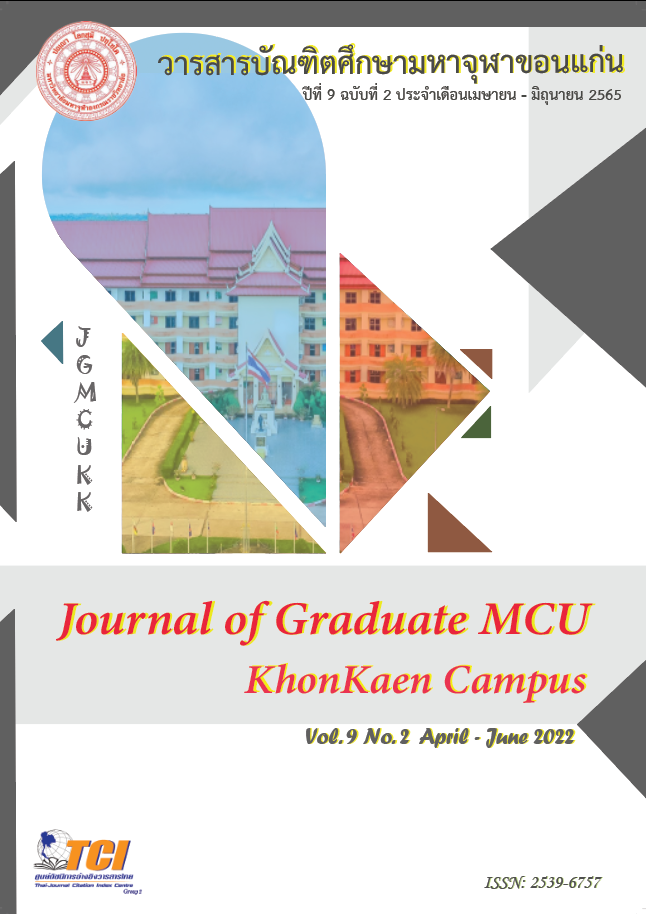การพัฒนาคุณธรรมจริยธรรมสำหรับครู The Morality and Ethical Development for Teachers
Main Article Content
บทคัดย่อ
คุณธรรมเป็นคุณลักษณะของคุณงามความดีในจิตใจอันจะนำไปสู่ความรู้สึกผิดชอบชั่วดีในทางศีลธรรมส่งผลกับการกระทำที่ดีซึ่งพฤติกรรมที่ดีงามอันเป็นหลักความประพฤติหลักการดำเนินชีวิตมีการปฏิบัติตนอยู่ในกรอบที่ดีงามที่เรียกว่า จริยธรรม เช่น การไม่ฆ่าสัตว์ ไม่เบียดเบียน ไม่ลักขโมยไม่ประพฤติผิดในกาม โดยจรรยาบรรณวิชาชีพครู (Teacher’s ethics and integrity) หมายถึง การประพฤติปฏิบัติตนถูกต้องตามหลักคุณธรรมจริยธรรม จรรยาบรรณวิชาชีพครูเป็นแบบอย่างที่ดีแก่ผู้เรียน และสังคม เพื่อสร้างความศรัทธาในวิชาชีพครู โดยคุณลักษณะของครูที่ดี ควรศึกษา เรียนรู้และพัฒนาตนเองอยู่เสมอ หมายรวมไปถึงการพัฒนาห้องเรียนให้เป็นสถานที่ซึ่งมีบรรยากาศที่ส่งเสริมการเรียนรู้ เพื่อให้ผู้เรียนเกิดการพัฒนาที่ยั่งยืน และแนวทางในการฝึกฝนเพื่อก้าวสู่การเป็นครูมืออาชีพ ถึงพร้อมด้วยคุณธรรมจริยธรรม ประกอบด้วย 1) ผู้สอนควรปฏิบัติตนให้มีความเหมาะสมตามหลักจรรยาบรรณวิชาชีพ 2) ต้องทำความรู้จักผู้เรียนเป็นรายบุคคล สามารถวิเคราะห์ผู้เรียนเป็นรายบุคคลได้ 3) จัดทำแผนการจัดการเรียนรู้ที่เน้นผู้เรียนเป็นสำคัญ เน้นทักษะการปฏิบัติ และ 4) หมั่นศึกษาและพัฒนาตนเองอยู่เสมอ ร่วมกิจกรรมการฝึกอบรมศีลและจริยธรรม
Article Details

อนุญาตภายใต้เงื่อนไข Creative Commons Attribution-NonCommercial-NoDerivatives 4.0 International License.
เอกสารอ้างอิง
กรมการศาสนา กระทรวงวัฒนธรรม. (2552). คู่มือการดำเนินงานเสริมสร้างศีลธรรมสำหรับเด็กและเยาวชน. กรุงเทพฯ: สำนักพัฒนาคุณธรรมจริยธรรม.
พระธรรมปิฎก (ป.อ.ปยุตฺโต). (2541). พุทธธรรม. กรุงเทพฯ: โรงพิมพ์มหาจุฬาลงกรณ์ราชวิทยาลัย.
มูลนิธิธารน้ำใจ. (2553). ความดี. กรุงเทพฯ: พิมพลักษณ์.
วศิน อินทสระ. (2549). จริยาบถ : แบบอย่างการดำเนินชีวิตที่ดีงาม. กรุงเทพฯ: บ้านหนังสือโกสินทร์.
สมจิต จันทร์ฉาย. (2557). การออกแบบและการพัฒนาการสอน. นครปฐม: เพชรเกษมพริ้นติ้ง กรุ๊ป จำกัด.
สมพร เทพสิทธา. (2549). ดวงประทีปจากพระบรมราโชวาท พระบาทสมเด็จพระเจ้าอยู่หัว : เพื่อถวายราชสักการะแด่พระบาทสมเด็จพระเจ้าอยู่หัวในมหามงคลสมัยทรงครองสิริราชสมบัติครบ 60 ปี. กรุงเทพฯ: พิมพ์สวย.
สำนักพัฒนาครูและบุคลากรทางการศึกษาขั้นพื้นฐาน. (2553). คู่มือประเมินสมรรถนะครู. (ฉบับปรับปรุง). กรุงเทพฯ: กระทรวงศึกษาธิการ.
อมรา เล็กเริงสินธุ์. (2552). คุณธรรมจริยธรรมสำหรับผู้บริหาร. กรุงเทพฯ: คณะครุศาสตร์ สถาบันราชภัฏสวนดุสิต.
______. (2545). ธรรมนูญชีวิต พุทธจริยธรรมเพื่อชีวิตที่ดีงาม. (พิมพ์ครั้งที่ 16). กรุงเทพฯ: โรงพิมพ์ชุมนุมสหกรณ์การเกษตรแห่งประเทศไทย จำกัด.
Kauchak, D.P. & Eggen, P.D. (2007). Learning and teaching: Research-based methods (5th ed.). New York: Pearson Education.

